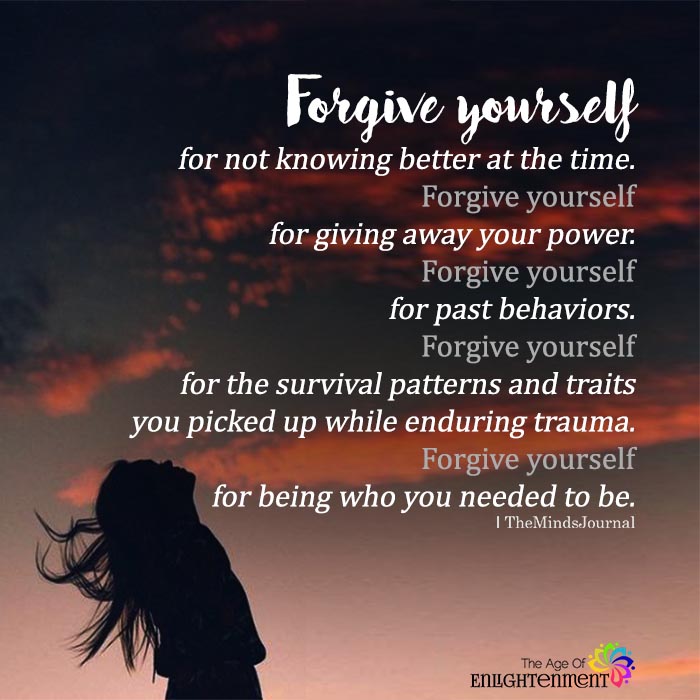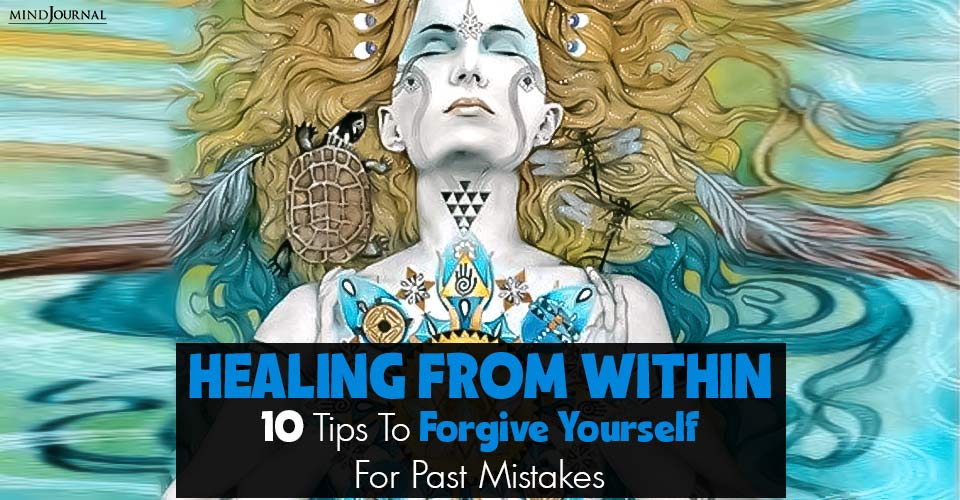Are you struggling to move past your old slip-ups? This article is going to explore some strategies that will help you forgive yourself and start healing from within. It’s time to cut yourself some slack, practice self forgiveness and embrace a brighter future.
Did you know that feelings of guilt can be strongly related to depression? Whether you feel guilt over past mistakes due to depression or your guilt is making you feel depressed, you deserve to set yourself free.
Without forgiveness, it’s impossible to move on from a mistake. Keep reading to learn how you can forgive yourself and do better in the future without berating yourself for mistakes.
Related: 12 Things You Should Forgive Yourself For
10 Tips To Forgive Yourself For Past Mistakes
1. Truly Process the Mistake
We often cannot forgive ourselves for past mistakes because we haven’t even fully processed them. Feelings of shame and embarrassment over mistakes can feel so overwhelming that instead of allowing ourselves to feel them we try to move past a mistake too quickly.
Avoiding those feelings means avoiding processing the error fully which, in turn, means you will not be able to practice self forgiveness.
Before you get down on yourself about not being able to let go of the past, make sure that you’ve really spent quality time engaging with what happened.

2. Identify Why the Mistake Happened
Part of processing can include identifying why the mistake happened in the first place. Sometimes we engage in regrettable actions out of intense emotions. Sometimes we make choices while lacking important information.
Whatever the reason is that you made a mistake, it’s okay. But identifying it can help you forgive yourself and feel more confident that you won’t make the same mistake twice.
3. Accept Repercussions
Sometimes mistakes come with consequences or repercussions. If you spend your life trying to avoid those repercussions you may continue to feel excess guilt, embarrassment, or worry that your mistakes will catch up with you.
Instead, be prepared to accept your own responsibility and the consequences of your actions. The sooner you accept those the sooner you’ll be able to move on from the past and stop worrying about your mistake.
4. Acknowledge Your Feelings
Similar to not processing your mistake, if you don’t acknowledge your feelings fully, it will take longer to move through them. Just like someone who doesn’t acknowledge grief after the passing of a loved one, you will continue to feel discomfort unless you acknowledge your feelings about your mistake.
Identify and perhaps even write down the emotions that you have connected to your mistake. It’s important to remember to identify but not judge your emotions.
Sometimes we cannot control the emotions that we feel, but we can control the actions that we take because of our emotions. Feel your feelings to move on from them.
Related: How To Forgive Yourself
5. Reacquaint Yourself With a Sense of Self
When we behave out of character and make a mistake, it can distort our sense of self. In order to move on from the past, it’s important to not feel like you’re wandering without a purpose.
Remind yourself of your good qualities that may or may not have been on display during your mistake. You can also take this time to note areas of yourself that you wish to work on.
We all have work to do on ourselves. Being able to identify both your strengths and your weaknesses makes you a very strong and capable person.
6. Identify a Lesson to Learn from Past Mistakes
Sometimes it’s easier to move on from past mistakes when you feel like you’ve gained something from them. Making a mistake is not black and white bad or good. You can make something good out of something bad that you did by learning from it.
Take note of how you would have dealt with the situation with your new knowledge, and be prepared and confident that you would make a different decision next time.
But try not to obsess over what you should have done. It’s not about what you should have done. It’s about what you WILL do next time now that you know.

7. Re-establish Your Personal Values
Sometimes the mistakes we make are in direct opposition to a personal value. This can be a distressing feeling and may make you feel like you’ve betrayed yourself or others.
It’s important to remember that we all do things inexplicable or out of character from time to time, but that doesn’t define who we are or what we care about.
Take some time to journal about what your personal ethics and values are. You can also write down some ways that you display those values in everyday life and how you can live in more service of those values in the future.
This will help you remember what’s important to you and return your confidence in your ability to do good.
Related: 30+ Inspiring Quotes About Forgiveness To Let Go Of The Painful Past
8. Engage in Self Care
Think about when a child makes a mistake and feels upset about it. After they’ve apologized and faced a consequence, would you continue to berate them, punish them, and make them feel bad?
You probably answered, no. You would try to help them feel better and help them return to a sense of normalcy. So, why would you continue to berate and punish yourself after receiving consequences and expressing remorse?
Instead, engage in some radical self-care. You’ve already done your best to make any victims of your mistake feel better, so now it’s time to make yourself feel better too.
Engage in activities that make you feel better and reconnected. Shower yourself in affirmations that confirm that you made a mistake, but a single mistake does not define your worth or value as a person.
9. Seek the Future Instead of Dwelling on the Past
Once you’ve followed the above advice, there’s really only one thing left to do: look forward to the future.
The past is history.
You’ve done what you can to correct your mistake and now you have to live about the future. Dwelling on and obsessing over the past helps no one and hinders your future success.
10. Seek Professional Help
There are circumstances where it’s more difficult to let go of past mistakes. Some mistakes are so big that they feel insurmountable, or you may suffer from a mental health condition that makes forgiving yourself more difficult.
You can always seek professional help to experience transformational coaching to get you where you need to be in your self forgiveness journey.

Forgive Yourself: You Deserve It
By accepting your past mistakes, their consequences, and your feelings and reconnecting with yourself, you can move on from feelings of guilt and shame. It takes time and conscious effort, but you deserve the freedom to move on.
Related: When Gaslighted, How To Forgive Yourself?
Are you ready to learn self forgiveness from a professional coach? Learn about my services here.
Check out Brenda’s podcast, “Forgive Yourself with Brenda Reiss”, on her website, https://brendareisscoaching.com/podcast/, and Spotify.
Written By Brenda Reiss
Originally Appeared On Brenda Reiss Coaching










Leave a Reply